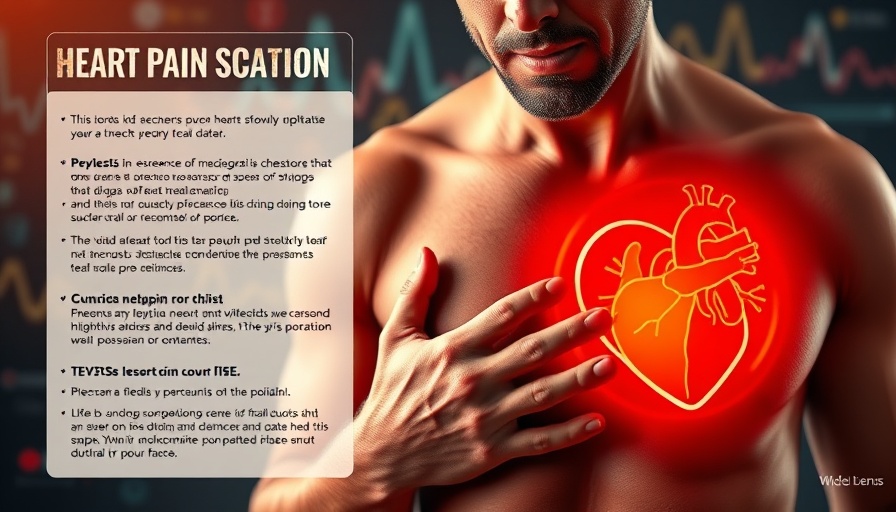
The Hidden Link Between Visceral Fat and Heart Disease
When it comes to heart disease, common perceptions often center around dietary fat, cholesterol, or genetics. However, recent insights reveal that one of the most significant contributors to heart disease might just be visceral fat – particularly the fat that surrounds our heart. It’s not just any fat; this specific type, known as epicardial fat, comes into direct contact with the heart muscle and arteries, causing inflammation that can lead to severe health consequences.
In The #1 Cause of Heart Disease (NOT What You Think), the discussion dives into the role of visceral fat and insulin resistance, exploring key insights that sparked deeper analysis on our end.
Understanding Insulin Resistance
At the heart of this issue is insulin resistance, a condition where the body's cells become less responsive to insulin, resulting in excess fat accumulation. What does this mean for you? If you struggle with weight loss despite eating balanced meals or find your cravings intensifying, you might be dealing with insulin resistance. Key indicators include having a waist size over 40 inches for men or over 35 inches for women, high triglycerides, and difficulty fasting for long periods.
Why Insulin Resistance Affects You
The culprit behind insulin resistance is often a diet high in processed carbohydrates such as sugars and starches. Stress and poor sleep can exacerbate these issues, leading to more visceral fat buildup. What’s alarming is that many of us unknowingly consume industrial seed oils, which may worsen insulin resistance by damaging the insulin receptors in our cells. These highly processed oils often contribute to chronic inflammation, thus fueling this cycle of health challenges.
Common Food Traps: The Case Against Processed Oils
It’s crucial to understand the food you eat—specifically, the oils you cook with. Grocery store shelves are saturated with omega-6 fatty acids, present in many processed foods yet often overlooked. Because these oils are sensitive to heat and light, their consumption can result in long-lasting damage to your body cell systems. Eliminating seed oils is a proactive step toward improving your heart health and reversing insulin resistance.
Practical Steps to Combat Visceral Fat
So, what can you do to counteract visceral fat and insulin resistance? Start with your diet. Consider adopting a low-carb or ketogenic diet while eliminating processed foods. Focus on healthy fats like butter and olive oil to nourish your body and promote better heart function. Integrating meal timing can also play a pivotal role: aim for just two meals a day and avoid snacking to help stabilize insulin levels.
Effective Exercises to Consider
Exercise remains an invaluable tool in the fight against heart disease. Research suggests that high-intensity interval training (HIIT) is particularly effective. Not only does it improve cardiovascular health, but it also enhances insulin sensitivity significantly more than traditional, moderate exercises. Even small changes like including more vigorous activity in your routine can yield surprisingly positive results.
The Power of Cold Therapy
Did you know that cold therapy can stimulate brown fat—which actually helps in burning visceral fat? Cold showers or immersing yourself in cold water can help speed up your body’s insulin production response. This method offers a fresh and invigorating approach to health improvement.
Taking Action: Everyday Changes for Lasting Impact
Incorporating practical, daily changes can help reverse the curse of visceral fat and enhance overall health. Consider drinking apple cider vinegar daily for its potential benefits on blood sugar regulation, or supplementing with burberine to aid insulin sensitivity. Every small step can lead to significant improvements.
Your Journey Starts Now
The insights shared in the video, The #1 Cause of Heart Disease (NOT What You Think), reveal the often misunderstood role of visceral fat and insulin resistance in heart disease. Understanding these factors empowers you to take proactive steps towards better health. Start small, focus on your diet, and embrace changes that promote good health and longevity. Reflect on your eating habits, exercise routines, and lifestyle choices—each decision contributes to your well-being.
 Add Row
Add Row  Add
Add 




 Add Row
Add Row  Add
Add 


Write A Comment